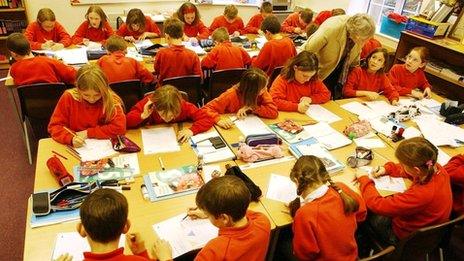Head teachers plan for new pupil-assessment systems
- Published

The levels are going in September, when the new primary curriculum comes in
Head teachers' leaders have outlined what they think schools in England should do once the national system for measuring pupils' performance is scrapped.
The system, where parents are told which "level" their children are working at, ends in September.
The government believes it was vague and too complicated for parents.
It has said schools will be expected to design their own systems to suit their children and parents.
Levels are currently used by schools to grade pupils aged from five to 14.
At the age of 11, when children leave primary school, they are expected to have achieved at least a Level 4 in English, maths and science.
Flaws
The National Association of Head Teachers has published guidelines for schools, setting out principles, external of how they should devise their own systems for assessing what pupils can do.
It set up a commission to look at the issue.
Russell Hobby, the union's general secretary, said heads should "take ownership of assessment".
"Just because the government ceases to regulate something does not mean the profession must accept fragmentation," he said.
"We can keep what was good about our previous system of assessment and address its flaws.
"The commission has taken a great deal of evidence, thought deeply about what might work and proposed a set of principles that can ensure consistency without strait-jacketing schools."
The commission, chaired by Lord Sutherland, calls on schools to adopt a "consistent approach to assessment across the country" and keep using levels while designing a new system.
It says pupils should be judged against "objective criteria" and not be ranked against each other.
Last year, Deputy Prime Minister Nick Clegg suggested children could be ranked against each other in a national table after tests at 11.
The government plans to change the national tests taken by 11-year-olds (known as Sats) and has been consulting on this, but this year's and next year's tests will be taken in May as normal.
The Education Secretary Michael Gove said: "The NAHT's report gives practical, helpful ideas to schools preparing for the removal of levels.
"It also encourages them to make the most of the freedom they now have to develop innovative approaches to assessment that meet the needs of pupils and give far more useful information to parents."
Mary Bousted, the general secretary of the at the Association of Teachers and Lecturers, said many primary teachers were concerned about the scrapping of levels.
"There is a danger that primary staff will spend a great deal of time devising their own assessment schemes, which risks inconsistency, or spend public money buying in commercial alternatives," she said.
The Department for Education has launched a competition where schools and academies can compete for £10,000 in funding to develop new assessment systems, with the idea of their being taken up by other schools.
Officials say schools can choose to use their own systems or work with other local schools.
- Published17 July 2013
- Published12 June 2012
- Published16 July 2013
- Published17 July 2013
- Published17 July 2013
- Published17 July 2013
- Published8 July 2013
- Published8 July 2013